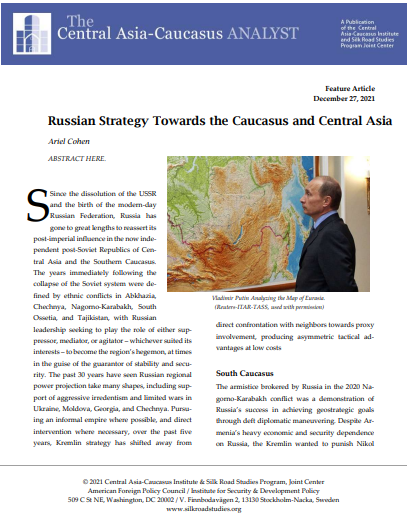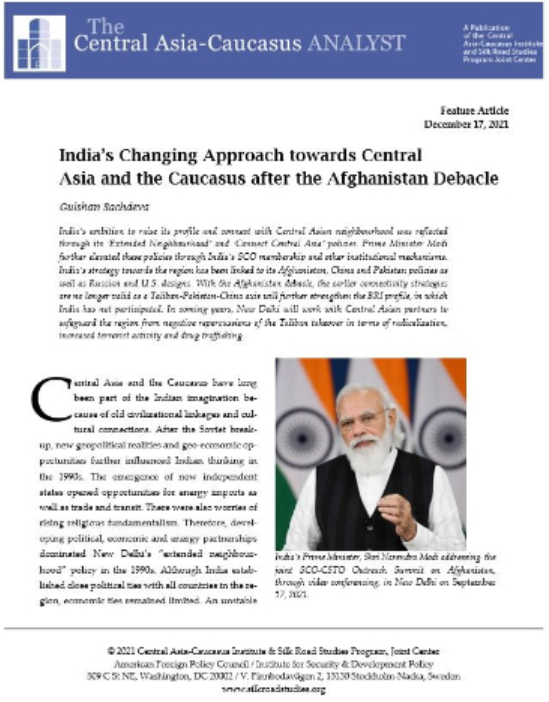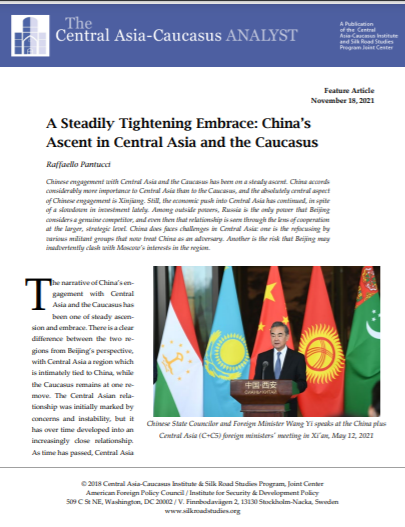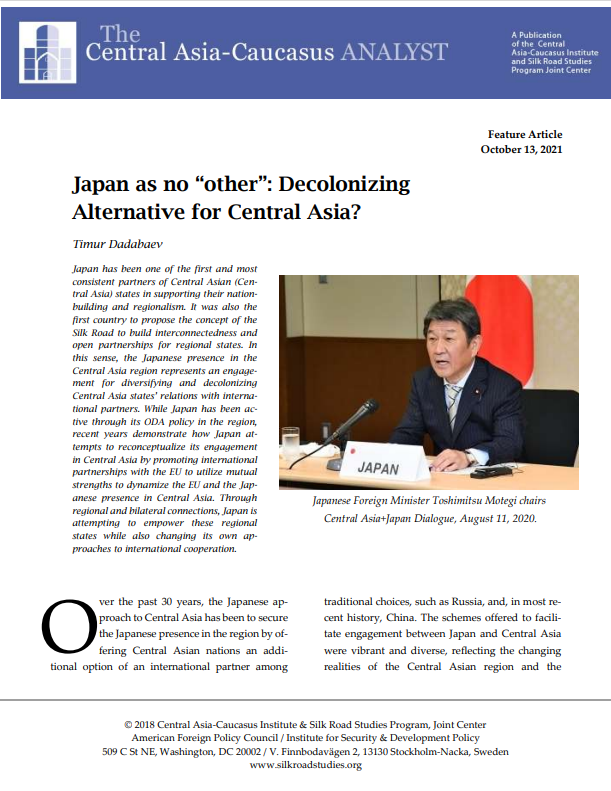The Central Asia-Caucasus Institute & Silk Road Studies Program Joint Center is proud to present a new series of analysis on the changing geopolitics of Central Asia and the Caucasus.
In recent years, a peculiar shift has appeared to happen: on one hand, there is a widespread perception of a decrease in U.S. attention toward this region. On the other, there is an equally perceptible uptick in the attention by other regional powers. Powers as diverse as Japan, South Korea, India and Turkey have expanded their relations with countries in Central Asia and the Caucasus. Meanwhile, Russia and China continue to be the most influential powers in the region, but it remains unclear whether their relationship in the region is one of partnership, competition, or both.
Against this background, the Joint Center resolved to look anew at the region's geopolitics. It will do so both by looking from the outside into the region, through studies of the policies of outside powers; and from the inside out, by studying also the perspectives of nations in the Caucasus and Central Asia toward their geopolitical context.
The articles in this series are published as Feature Articles in the Central Asia-Caucasus Analyst and mirrored on this page for convenience.
 Russian Strategy towards the Caucasus and Central Asia: A Dominant Power on Defense?
Russian Strategy towards the Caucasus and Central Asia: A Dominant Power on Defense?
By Ariel Cohen
January 27, 2022
In the thirty years since the collapse of the Soviet Union, the Russian Federation has sought to reassert its regional dominance over its neighbors through both direct confrontation and soft power. Despite the country’s progress with consolidating its sphere of influence, which includes the January 2022 CSTO deployment in Kazakhstan, Moscow’s goal of regional hegemony is far from assured. The rise of China, radical trans-national Islam, the potential spill-over of Taliban ascendancy in Afghanistan, and maturing of post-Soviet nation-states present roadblocks to Russian ambitions. Moscow must carefully manage its interactions with Beijing, keep Turkey, Islamism and the Taliban in check, and respect nationhood in the Caucasus and Central Asia. It is a tall order.
 India's Changing Approach towards Central Asia and the Caucasus after the Afghanistan Debacle
India's Changing Approach towards Central Asia and the Caucasus after the Afghanistan Debacle
By Gulshan Sachdeva
December 17, 2021
India’s ambition to raise its profile and connect with Central Asian neighbourhood was reflected through its ‘Extended Neighbourhood’ and ‘Connect Central Asia’ policies. Prime Minister Modi further elevated these policies through India’s SCO membership and other institutional mechanisms. India’s strategy towards the region has been linked to its Afghanistan, China and Pakistan policies as well as Russian and U.S. designs. With the Afghanistan debacle, the earlier connectivity strategies are no longer valid as a Taliban-Pakistan-China axis will further strengthen the BRI profile, in which India has not participated. In coming years, New Delhi will work with Central Asian partners to safeguard the region from negative repercussions of the Taliban takeover in terms of radicalization, increased terrorist activity and drug trafficking.
 A Steadily Tightening Embrace: China's Ascent in Central Asia and the Caucasus
A Steadily Tightening Embrace: China's Ascent in Central Asia and the Caucasus
By Raffello Pantucci
November 18, 2021
Chinese engagement with Central Asia and the Caucasus has been on a steady ascent. China accords considerably more importance to Central Asia than to the Caucasus, and the absolutely central aspect of Chinese engagement is Xinjiang. Still, the economic push into Central Asia has continued, in spite of a slowdown in investment lately. Among outside powers, Russia is the only power that Beijing considers a genuine competitor, and even then that relationship is seen through the lens of cooperation at the larger, strategic level. China does faces challenges in Central Asia: one is the refocusing by various militant groups that now treat China as an adversary. Another is the risk that Beijing may inadvertently clash with Moscow’s interests in the region.
 Japan as No "Other:" Decolonizing Alternative for Central Asia?
Japan as No "Other:" Decolonizing Alternative for Central Asia?
By Timur Dadabaev
October 13, 2021
Japan has been one of the first and most consistent partners of Central Asian (Central Asia) states in supporting their nationbuilding and regionalism. It was also the first country to propose the concept of the Silk Road to build interconnectedness and open partnerships for regional states. In this sense, the Japanese presence in the Central Asia region represents an engagement for diversifying and decolonizing Central Asia states’ relations with international partners. While Japan has been active through its ODA policy in the region, recent years demonstrate how Japan attempts to reconceptualize its engagement in Central Asia by promoting international partnerships with the EU to utilize mutual strengths to dynamize the EU and the Japanese presence in Central Asia. Through regional and bilateral connections, Japan is attempting to empower these regional states while also changing its own approaches to international cooperation.


